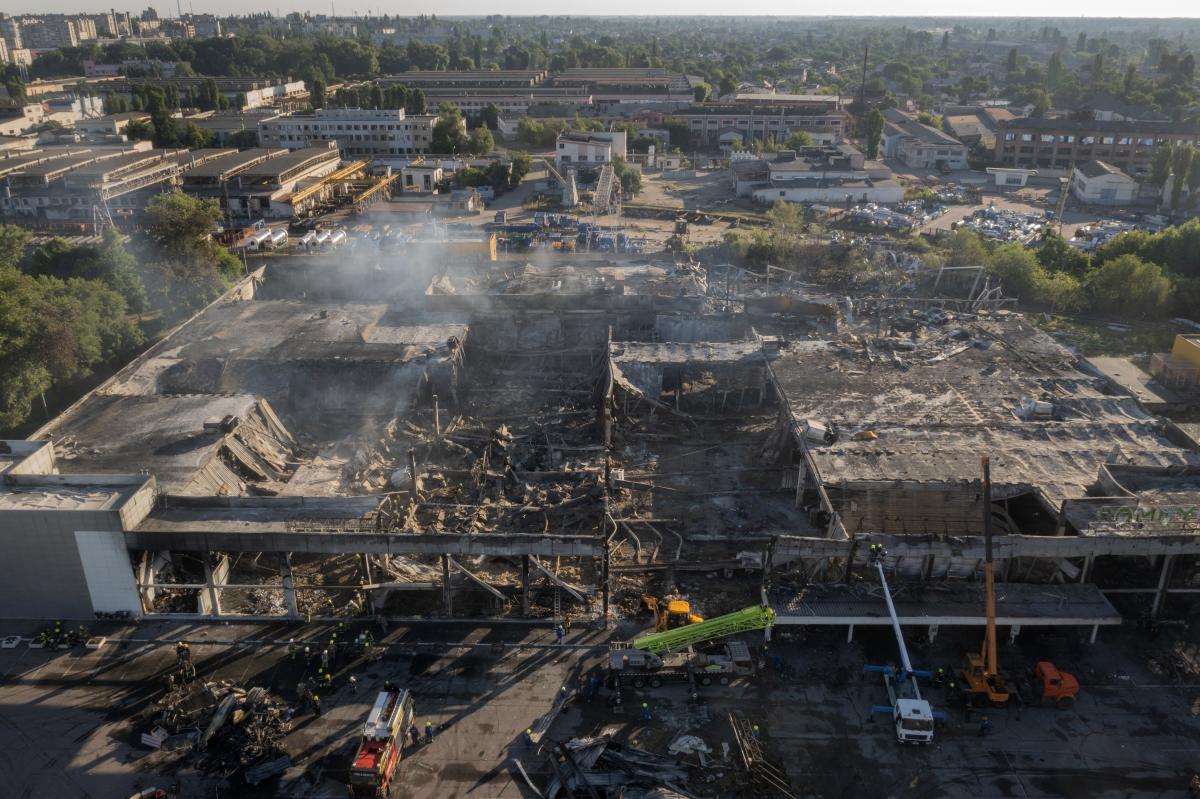KYIV, Ukraine (AP) — The latest in a litany of horrors in Ukraine came this week as Russian firepower rained down on civilians in a crowded shopping center far from the front lines of a fifth-month war.
The timing was probably no coincidence.
While much of the war of attrition in eastern Ukraine has been hidden from view, the brutality of Russian rocket attacks on a shopping center in the central city of Kremenchuk and on residential buildings in the capital Kiev took place in full view of the world and especially of the Western world. leaders gathered for three summits in Europe.
Were the attacks a message from Russian President Vladimir Putin as the West sought to arm Ukraine with more effective weapons to bolster its resistance and put Ukraine on the path to joining the European Union?
Kiev mayor Vitali Klitschko suggested that rockets hit the capital on June 26, three days after EU leaders unanimously voted to run Ukraine as a candidate for membership.
It was “perhaps a symbolic attack” as the Group of Seven leading economic powers and then NATO leaders prepared to meet and put further pressure on Moscow, he said. At least six people were killed in the strike in Kiev that destroyed an apartment building.
Former commander of US forces in Europe, retired Lieutenant General Ben Hodges, went further in linking the attack and the rallies. “The Russians are humiliating the leaders of the West,” he said.
A day after the attack in Kiev, when G-7 leaders met in Germany to discuss further support for Ukraine at their annual summit, Russia fired missiles into a busy shopping center in the central Ukrainian city of Kremenchuk, killing at least 19 people died.
The timing of both attacks seemed to alternate with the European meetings of US President Joe Biden, British Prime Minister Boris Johnson, German Chancellor Olaf Scholz and French President Emmanuel Macron, all supporters of Ukraine.
Putin and his officials defy the evidence and deny that Russia has hit residential areas. Putin has denied that Russian troops attacked the Kremenchuk shopping center and said it targeted a nearby weapons depot. But Ukrainian officials and witnesses said a missile hit the mall directly.
It was not the first time that eruptions of violence were widely seen as signals of Moscow’s dismay. Russian missiles hit Kiev in late April, just an hour after Ukrainian President Volodymyr Zelenskyy held a press conference with visiting UN Secretary-General Antonio Guterres.
“This says a lot about Russia’s true attitude to global institutions,” Zelensky said at the time. The mayor of Kiev called the attack Putin’s way of giving the “middle finger”.
The Russian president recently warned that Moscow would attack targets it had so far spared if the West provided Ukraine with weapons that could reach Russia. If Kiev gets long-range missiles, Russia “will draw appropriate conclusions and use our destructive means, which we have enough,” Putin said.
On Friday, a day after Russian forces made a striking retreat from Snake Island near the Black Sea port city of Odessa in what Ukraine called a barrage of artillery and missile strikes, Russia bombed residential areas in a coastal town in the near Odessa and killed at least 21 people, including two children.
While Russia’s messages can be blunt and devastating, the signals from Ukraine under Zelenskyy are aimed daily at amplifying Moscow’s brutality against a world that every day risks growing weary of war.
If interest wanes, so can the collective support seen at global summits. and with it the urgency to deliver the heavier weapons that Ukraine craves.
Zelenskyy tends to associate pleas for more help with memories that ultimately all of Europe is at stake.
He described the attack at the mall as “one of the most daring terrorist attacks in European history”.
For all the undeniable suffering of Ukraine, in this century alone it was a bold statement of exaggeration in the context of extremist attacks with mass deaths in Paris, Nice, Brussels, Madrid and London.
For Zelensky and Ukraine, the underlying question cannot be repeated enough: Get more heavy weapons, and faster, before Russia makes perhaps irreversible gains in the eastern industrial region of the Donbas, where street-by-street fighting rages on.
In his nighttime public speeches, Zelenskyy also makes sure to capture the traumatic toll of everyday life in Ukraine, appealing to the rest of the world far beyond world leaders.
This week he accused Russia of sabotaging “people’s attempts to lead normal lives”.
Images of smoking debris in the mall said the rest.
†
Fakahany reported from London.
†
Follow AP’s coverage of the war in Ukraine at https://apnews.com/hub/russia-ukraine

